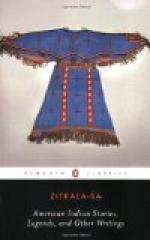The shrewd schemers noted her behavior. “Wouldn’t you rather have a half of a crust of bread than none at all?” they asked. She was duly impressed with the force of their argument. In her heart she agreed, “A little something to eat is better than nothing!” The two men talked in regular relays. The flow of smooth words was continuous and so much like purring that all the woman’s suspicions were put soundly to sleep. “Look here, aunt, you know very well that prairie fire is met with a back-fire.” Blue-Star Woman, recalling her experiences in fire-fighting, quickly responded, “Yes, oh, yes.”
“In just the same way, we fight crooks with crooks. We have clever white lawyers working with us. They are the back-fire.” Then, as if remembering some particular incident, they both laughed aloud and said, “Yes, and sometimes they use us as the back-fire! We trade fifty-fifty.”
Blue-Star Woman sat with her chin in the palm of one hand with elbow resting in the other. She rocked herself slightly forward and backward. At length she answered, “Yes, I will pay you half of my share in tribal land and money when I get them. In bygone days, brave young men of the order of the White-Horse-Riders sought out the aged, the poor, the widows and orphans to aid them, but they did their good work without pay. The White-Horse-Riders are gone. The times are changed. I am a poor old Indian woman. I need warm clothing before winter begins to blow its icicles through us. I need fire wood. I need food. As you have said, a little help is better than none.”
Hereupon the two pretenders scored another success.
They rose to their feet. They had eaten up all the fried bread and drained the coffeepot. They shook hands with Blue-Star Woman and departed. In the quiet that followed their departure she sat munching her small piece of bread, which, by a lucky chance, she had taken on her plate before the hungry wolves had come. Very slowly she ate the fragment of fried bread as if to increase it by diligent mastication. A self-condemning sense of guilt disturbed her. In her dire need she had become involved with tricksters. Her nephews laughingly told her, “We use crooks, and crooks use us in the skirmish over Indian lands.”
The friendly shade of the house shrank away from her and hid itself under the narrow eaves of the dirt covered roof. She shrugged her shoulders. The sun high in the sky had witnessed the affair and now glared down upon her white head. Gathering upon her arm the mats and cooking utensils, she hobbled into her log hut.
Under the brooding wilderness silence, on the Sioux Indian Reservation, the superintendent summoned together the leading Indian men of the tribe. He read a letter which he had received from headquarters in Washington, D.C. It announced the enrollment of Blue-Star Woman on their tribal roll of members and the approval of allotting land to her.
It came as a great shock to the tribesmen. Without their knowledge and consent their property was given to a strange woman. They protested in vain. The superintendent said, “I received this letter from Washington. I have read it to you for your information. I have fulfilled my duty. I can do no more.” With these fateful words he dismissed the assembly.




